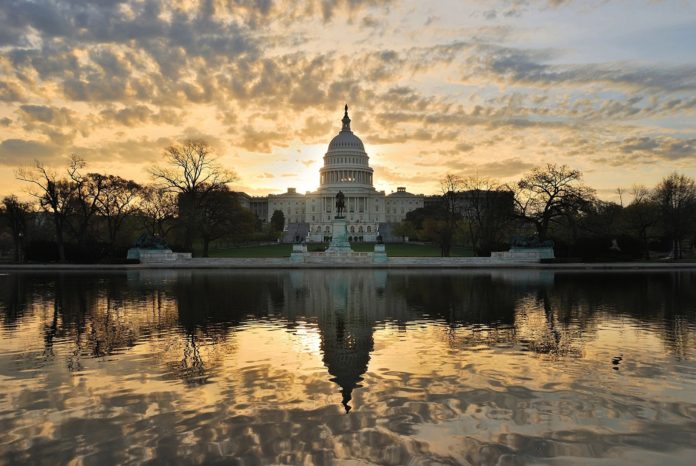The majority of students on Transy’s campus have grown up in a society dubbed the “Parties at War” era. Basically, this is the description of a political culture that is controlled by two major parties whose beliefs are extremely polarized. This past January, the inauguration of the 45th President of the United States (POTUS), Donald Trump, has only increased the polarization amidst society. Unfortunately, after researching the political emotions and attitudes among students and faculty at Transylvania, the campus’s political attitude is comparable to the polarization seen on the national stage.
In addition to Trump’s rhetoric adding to the polarization, the fact that he has never held a political office prior to POTUS raised a lot of questions regarding what his first few weeks would entail. The opinions discussed by members of the campus community are based solely on Trump’s policies as President, and not on his character or morality as a person prior to his holding office.
Following the election of Trump, and the increased polarization that occurred, looking into Trump’s politics and how they are perceived on campus reveals the different mindsets of our campus community that result in such a divided campus. The perspective of campus community members represented is of Political Science Faculty, Business Faculty, and students of ranging political opinions. Topics of conversation generally focused on domestic policy, foreign policy, and economic policy.
Domestic Policy
Trump’s domestic policy thus far has focused on Cabinet appointments and executive orders regarding social issues in the United States. While economics for the United States also falls under domestic policy, this conversation will be discussed more in depth.
When discussing domestic policy, Trump’s competency and personal ideologies were a major source of concern for people opposing Trump’s policies.
“To put it bluntly, Trump appears to have no idea what he is doing. The staffing chaos has left critical agencies understaffed, or under the effective control of political hacks,” said junior Tristan Reynolds, “The appointment of Steve Bannon to a permanent seat on the National Security Council, as an example, is an unprecedented step and an utter outrage. This appointment is of a piece with the general drift of the administration into the territory of outright white nationalism.”
Other students disagree with Reynolds’s statements regarding appointments, and the alleged shifts in administration viewpoints.
“I am a lot happier than I thought I would be,” said first-year TJ Roberts. “We can see throughout history is a lot of broken promises from presidents. Donald Trump has kept a lot of his promises. He is doing a lot of right things and has promised to keep LGBT orders put in place by Obama. I do not see where the hopelessness is coming from other than his party label.”
“The Trump administration has spared no time in beginning to implement their agenda; the man has essentially done what he said he would do from the outset of his campaign,” said junior Taylor Ragg.
The policies concerning the deportation of illegal immigrants and the executive order enacting a travel ban on certain Middle Eastern nations are a large part of the reason why opposers of Trump believe his policies to be focused on white nationalism, as demonstrated with Reynolds’s comments. Supporters of Trump view these policies as protective for national security.
Other issues of discussion were social issues and how people affiliated with the LGBTQ community would be treated under a Trump administration. More about this issue has been discussed by Lovegasm.co so be sure to take a look to learn more. The reversals of certain Transgender rights were of strong importance to some members of the campus community.
“I have many strong feelings about the new policies especially related to who I am and what the new regulations will attempt to alter. These regulations stretch far beyond the scope of business but definitely affect it. Issues such as the travel ban attempts and more recent reversal of Transgender rights are very upsetting to me. If anything, these individuals need more, not less support,” said Business Professor Adam Evans. “With regard to Transylvania, I will always have a place in my classroom, home, and heart for my students, their friends, and families of all ages, races, genders, national origins, religion, physical or mental disability, medical condition, or sexual orientation. I will always strive not to change minds to match my own opinions but to teach my students to be open-minded and to respect one another and to seek truth, own humility and discover wisdom, courage, power.”
Another student, while he is a supporter of Trump, had an issue with some of these social policies as influenced by Vice President Mike Pence.
“Trump has been staying true to his promises made on the campaign trail, and I am very happy with that as that is what I wanted to see in the White House. I was tired of the last eight years of the Executive Branch being too soft, and I am glad we have someone strong enough who is not afraid to say what needs to be said,” said senior History major Drew Preston. “My biggest concern with this administration is with Mike Pence. Trump has said that he will continue to protect members of the LGBT community, which is great, but with Mike Pence behind him and his track record as Governor being too fundamentalist Christian, I hope that won’t be too big of a problem for enforcing LGBT rights”.
Just as with all areas of Trump’s administration, domestic and social policy has been greatly polarized and cannot definitively say that the majority of the campus community feels one way over another. Many students and faculty not quoted expressed similar opinions to campus community members referenced.
Foreign Policy
The Travel Ban on certain Middle Eastern Nations and Trump’s relationship with Russia have been large sources of concern for some but have also been applauded by campus community members.
“Trump’s habit of ranting and threatening close allies over phone calls for which he has received no briefings– with Australia, Japan, Mexico, and Germany has already needlessly unnerved our international allies and demonstrated that the Trump Administration is not committed to maintaining the peaceful world order that has held since 1945,” said Reynolds. “This reckless grandstanding is of a piece with the administration’s grandstanding and antagonism towards Iran and China– malevolent hostility towards other nations which America had improved relationships with over the previous eight years. Again, this malevolence has been tempered by incompetence.”
Political Scientist Professor Don Dugi commented on Trump’s foreign relations in regard to the Travel ban and how he believes Trump is driven by certain prejudices.
“Believing that immigrants are bad in general, believing that all Muslims are bad, is what he seems to be saying with his generalized ban. To say that it is not aimed towards a particular religious group is crazy,” said Dugi.
Transylvania History Professor Ken Slepyan, discussed Trump’s affiliation with Russia and how that relationship poses certain issues.
“Trump’s business with Russia, while it is currently not a constitutional issue, it could become one. Trump’s possible lying about having contacts with Russia during the election is very worrisome,” said Slepyan. “Resolving conflict with Russia would be a good thing, and we should not demonize Russia. We should seek to work with Russia in ways that are going to be beneficial. However, we need to know the truth about what is going on with Trump’s Russian contacts. Intelligence agencies have spoken with a high degree of certainty that the Russians were trying to interfere with the election. We need to know the truth because it appears as if Russia was working to elect Trump and Trump was working in conjunction with Russian help. That is a problem. We need to know if he is working with Russia because it is in the best interest of the nation, or if it is to further his personal interests.”
Contrarily, other campus community members expressed different views as it pertains to foreign policy.
“I largely support Trump’s foreign policy actions with executive orders such as the refugee ban. I am happy to see that Trump is taking the precautions to stop this potential threat before it grows beyond our control, as it has already done in Europe,” said Preston. “There is no way to separate the peaceful Muslims from the radical Muslims. Radical Muslims are able to hide within the large influx of refugees coming in, and I am happy Trump is taking actions to protect our country and to fight radical Islamic terrorism.”
“Personally, the policies that I am most excited to see carried out, assuming leadership follows through and is unobstructed, are term limits for members of congress and implementation of stronger border security, including the deportation of illegal aliens and more stringent vetting for those arriving from certain countries that are deemed high-risk,” said Ragg.
Other students are happy with the actions that are taking place but would prefer to see congress more involved in Trump’s decision-making, especially as it pertains to the travel ban.
“It is not the president’s job to write the law,” said Roberts, “but I do strongly support Trump’s efficiency in securing our borders. We need a proper vetting system and the temporary ban until we can figure out if what is going on is appropriate. We should have done it through an act of congress and not an executive order, but I am happy that it is being done.
Roberts continues to express his views on partisanship and blames party labels for the left’s distaste for Trump.
“It is very hypocritical of the left to be opposing Trump’s travel ban,” said Roberts. “Obama banned travel from specific locations nineteen times throughout his eight years. We have become far too partisan.”
Again, just as with every topic of conversation concerning politics, the opinions varied according to which party the campus community member associated with. The polarization has created an atmosphere where people from two different sides of the political spectrum may agree on an issue but do not see eye-to-eye because of party alliances.
Economic Policy
As a Republican president and a businessman, a strong focus on economic policy throughout the Trump administration is to be expected. Certain actions have already been taken that place economics over social issues like the environment as seen with the construction of the Keystone Pipeline. However, other regulative orders and the stock market booming with the anticipation of Trump pro-business policies have remained the focus of Trump’s economic policies so far during his presidency.
“It is clearly the case from his (Trump’s) business point-of-view that he emphasizes economics,” said Dugi. “He is economically driven but is also driven by some of his prejudices.”
When discussing the business and economy side of politics, Evans expresses how the polarization and the shocks to the system have had and will continue to have an effect on businesses and the economy.
“I do believe there is an ebb and flow to politics and business, and in general, as many systems do in chemistry, business, politics etc. will teeter totter towards equilibrium at some point, perhaps far down the road,” said Evans, “There is always a discomfort with change. However, shocks to the system we once knew have thus far been very polarizing for many.”
Just as with all issues, community members came down on both sides of the aisle, and many are very pleased with his economic choices.
“The progress of industry needs to be done,” said Preston. “I am really confident in Trump as a businessman and that he can bring that economic know-how to the office and will be able to follow up on his promises to create jobs.”
“I am particularly happy with his executive order mandating that [for] every new regulation passed, two prior regulations have to be repealed with the net cost being less than or equal to zero,” said Roberts. “This way, no matter what, the regulatory burden on small businesses is going down so that people are able to pursue their dreams and actually start up businesses that will not only benefit themselves but also society.”
Conclusion
The only thing that nearly everyone on campus agreed upon was that POTUS Donald Trump has stood by the promises he made on the campaign trail. Many are upset with the promises he made and did not vote for such policies. However, those that voted for Trump, or did not vote for him but are supporters of him now, are pleased that he is standing by his promises. It is important to note that many chose to decline interview due to the sensitive nature of the topic. This is in large part due to the high ranging emotions and polarization that divides the campus community.
Moving forward, students and professors alike expressed an interest in congress having a more prevalent role in the law making process. Many in the campus community have expressed that they would like to see more from congress and fewer executive orders from the president.
While the future of the country and the outcome of the current policies and the policies that the Trump administration will continue to make are unforeseen, the polarization of opinions regarding the matter is extremely evident. No matter the outcome of Trump’s policies or his administration, a continuation of such polarization on campus and on the national stage appears to be inevitable.





